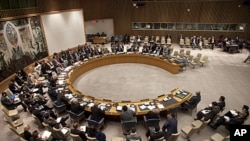The United Nations Security Council has unanimously approved a resolution authorizing up to 300 unarmed U.N. observers to be deployed to Syria to monitor a fragile 10-day old truce. The additional monitors will join a small advance team already on the ground in Syria.
The measure approved Saturday is a follow-up to Security Council resolution 2042, adopted unanimously one week ago, which approved a small contingent of up to 30 unarmed U.N. military observers to be sent to Syria. A handful of them are on the ground in Syria now.
Russia drafted the resolution, which had input and was co-sponsored by several other council members, including Morocco, China, France and Germany.
Previously Moscow used its council veto to block two earlier attempts at censuring Damascus over its bloody crackdown. After Saturday’s vote, Russian Ambassador Vitaly Churkin appeared to be trying to reverse past criticism, telling reporters that Russia had worked hard “to put the Security Council on the right track”.
“We do believe we have broad international support and that our strategy is more and more understood internationally, despite long-standing efforts and massive efforts to malign Russia’s position on the situation in Syria. We believe we have played a crucial role in trying to revert the cycle of events in Syria from confrontation and violence to a political outcome. Of course this is not guaranteed yet," he said.
Under the terms of newly adopted resolution 2043, up to 300 unarmed military observers will be dispatched for an initial deployment of 90 days. The mission is also authorized to include an additional “appropriate” number of civilians who would have expertise in such areas as politics, human rights and civil affairs. It is up to the U.N. Secretary-General to decide if conditions on the ground are conducive to deploying them.
But while the council threw its united support behind the supervision mission, it was not without reservations.
German Ambassador Peter Wittig said his government supported the resolution because it shares the secretary-general’s and his special envoy Kofi Annan’s assessment that a deployment of observers under the right conditions could positively influence the situation on the ground. “At the same time, we must all be aware that the decision taken today is not without risks. Clearly, the cessation of armed violence is incomplete. The authorities in Damascus continue its attacks on the population, it continues to shell the city of Homs with artillery, and it has not withdrawn their troops and tanks to the barracks," he said.
U.S. Ambassador Susan Rice was more direct, telling the council Washington would not wait the full 90 days of the initial deployment to pursue other measures against Damascus if it continues to violate international commitments or obstruct the work of the monitors.
“The Syrian people, like us, know that the deployment of 300, or even 3,000, unarmed observers cannot on its own stop the Assad regime from waging its barbaric campaign of violence against the Syrian people. What can bring a halt to this murderous rampage is continued and intensified external pressure on the Assad regime," she said.
British Ambassador Mark Lyall Grant told reporters that in the event of non-compliance he would expect the Security Council to discuss imposing sanctions on the Syrian government.
U.N. Secretary-General Ban Ki-moon welcomed the adoption of resolution 2043, saying the challenges on the ground in Syria are serious and too many lives have been lost, but he hopes the establishment of the full supervision mission will help stop the killing and suffering.
The resolution calls on the Syrian government to comply with the six point plan and pull back its troops and heavy weapons from in and around population centers to their barracks. Ambassador Churkin said he had just seen a letter from the Syrian foreign minister to Kofi Annan stating that Syria had complied with this request. The Syrian Ambassador also confirmed this to the council. It will now be up to the monitors to verify if it has been done.
The United Nations estimates that more than 9,000 people have been killed since President Bashar al-Assad’s government began a crackdown on political dissent more than 13 months ago.
Since the truce went into effect on April 12, some violence has been reported, including intense government shelling of the city of Homs. Activists reported the city was quiet Saturday as monitors with the U.N. advance team visited the flashpoint town.
| Join the conversation on our social journalism site - Middle East Voices. Follow our Middle East reports on Twitter and discuss them on our Facebook page. |




